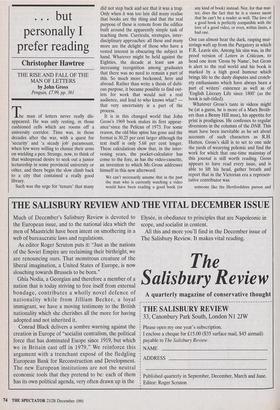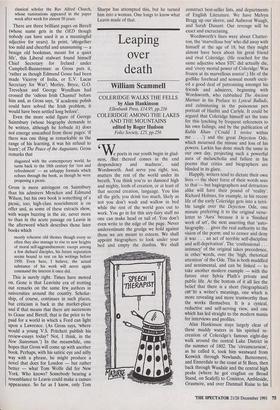. . . but personally I prefer reading
Christopher Hawtree
THE RISE AND FALL OF THE MAN OF LE IThRS by John Gross Penguin, f7.99, pp. 361 he man of letters never really dis- appeared. He was only resting, in those cushioned cells which are rooms off a university corridor. Time was, in those decades after the war, with a quest for `security' and 'a steady job' paramount, when few were willing to chance their arms on wielding a pen. Strange, now, to think of that widespread desire to seek out a junior lectureship in some provincial university or other, and there begin the slow climb back to a city that contained a really good library.
Such was the urge for 'tenure' that many did not step back and see that it was a trap. Only when it was too late did many realise that books are the thing and that the real purpose of these is remote from the edifice built around the apparently simple task of teaching them. Curricula, strategies, inter- disciplinary approaches: all these and many more are the delight of those who have a vested interest in obscuring the subject in hand. Whatever might be held against the Eighties, the decade at least saw an increasing recognition among graduates that there was no need to remain a part of this. So much more beckoned, here and abroad. Rather than write a thesis of dubi- ous purpose, it became possible to find out- lets for work that would suit a real audience, and lead to who knows what? that very uncertainty is a part of the process.
It is in this changed world that John Gross's 1969 book makes its first appear- ance' since the Pelican of 1973. For some reason, the old blue spine has gone and the format is 30.25 per cent larger although the text itself is only 5.68 per cent longer. These calculations show that, in the inter- vening years, the pocket-calculator has come to the fore, as has the video-cassette, an invention to which Mr, Gross addresses himself in this new afterword: We can't necessarily assume that in the past the man who is currently watching a video would have been reading a good book (or
any kind of book) instead. Nor, for that mat- ter, does the fact that he is a viewer mean that he can't be a reader as well. The love of a good book is perfectly compatible with the love of a good video, or even, within limits, a bad one.
One can almost hear the dark, rasping mut- terings waft up from the Purgatory in which F.R. Leavis sits. Among his sins was, in the proof version of Letters in Criticism, to head one item 'Gross by Name', but Gross is alert to the real world and his book is marked by a high good humour which brings life to the dusty disputes and crotch- ety enthusiasms which have always been a part of writers' existence as well as of `English Literary Life since 1800' (as the book is sub-titled).
Whatever Gross's taste in videos might be (at a guess, he is more of a Marx Broth- ers than a Benny Hill man), his appetite for print is prodigious. He confesses to regular diversions in the columns of the DNB. This must have been inevitable as he set about accounts of such characters as R.H. Hutton. Gross's skill is to set to one side the yards of wearying polemic and find the work for which that one-time mainstay of this journal is still worth reading. Gross appears to have read every issue, and is able to lift his head, gather breath and report that in the Victorian era a represen- tative contributor was
someone like the Hertfordshire parson and classical scholar the Rev Alfred Church, whose ruminations appeared in the paper week after week for almost 50 years.
There are three brilliant pages on Birrell (whose name gets in the OED though nobody can have used it as a meaningful adjective for years). In print, 'altogether too mild and cheerful and unassuming — a benign old bookman, meant for a quiet life', this Liberal stalwart found himself Chief Secretary for Ireland f under Campbell-Bannerman: as Gross puts it, `rather as though Edmund Gosse had been made Viceroy of India, or E.V. Lucas Secretary for War'; Morley, Bryce, G.O. Trevelyan and George Wyndham had crossed the 'odious Irish Channel' before him and, as Gross says, 'if academic polish could have solved the Irish problem, it would have been settled long before'.
Even the more solid figure of George Saintsbury (whose biography demands to be written, although he forbade it) does not emerge unscathed from these pages: 'if there was one thing as remarkable as the range of his learning, it was his refusal to learn'; of The Peace of the Augustans, Gross remarks that
disgusted with the contemporary world, he turns back to the 18th century for 'rest and refreshment' — an unhappy formula which echoes through the book, as though he were proposing a picnic.
Gross is more astringent on Saintsbury than his admirers Mencken and Edmund Wilson, but his own book is something of a picnic, too; high-class nourishment is on offer and, as some of these extracts show, with wasps buzzing in the air, never more so than in the acute passage on Leavis in the afterword which describes those later books which
mostly rehearse old themes though every so often they also manage to rise to new heights of moral self-aggrandisement: except among a few diehard disciples, his future reputation seems bound to rest on his writings before 1950. Even here, I believe, the actual substance of his work will never again command the interest it once did.
This is surely right. Times have moved on. Gone is that Leavisite era of trotting out remarks on the same few authors in universities around' the coun6. Scholar- ship, of course, continues in such places, but criticism is back in the market-place and if that means that there are successors to Gosse and Birrell, that is the price to be paid for a world in which a Ford can light upon a Lawrence. (As Gross says, 'where would a young V.S. Pritchett publish his review-essays today? Not, I think, in the New Statesman.') In the meanwhile, one hopes that Gross will come up with another book. Perhaps, with his satiric eye and nifty way with a phrase, he might produce a novel that does for London — but rather better — what Tom Wolfe did for New York. Who knows? Somebody bearing a resemblance to Leavis could make a cameo appearance. So far as I know, only Tom Sharpe has attempted this, but he turned him into a woman. One longs to know what Leavis made of that.











































































































 Previous page
Previous page